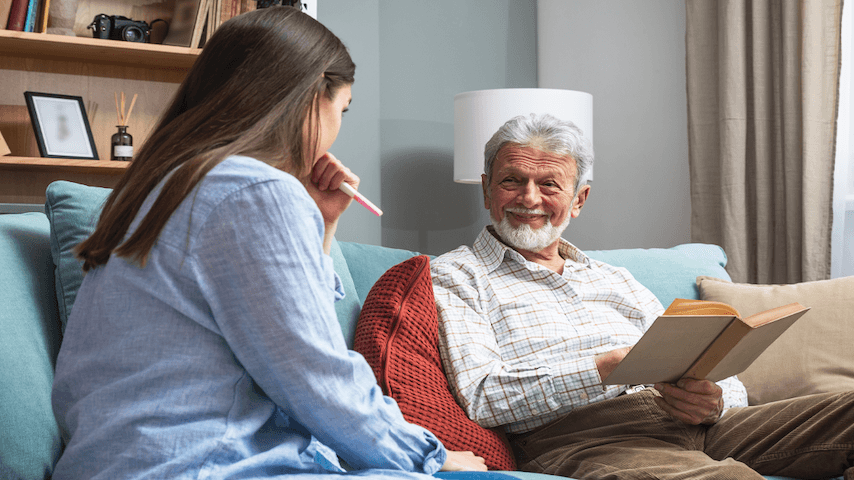
Related Topics
Approximately one in three people between age 65 and 74 suffers from some type of hearing loss. While it’s a common complaint, trouble with hearing can have a serious and far-reaching effect on an older person’s quality of life.
How hearing loss affects older adults
Trying to converse with others in loud social settings can be frustrating for seniors with hearing loss, causing them to avoid gatherings and events and spend more time alone. It’s no wonder, then, that hearing loss has been linked with depression in 47% of adults who experience it. People with trouble hearing may also find it difficult to take part in the activities that used to bring them joy.
Giving up socializing and hobbies, however, can have a negative long-term impact. In addition to mental health issues such as depression and anxiety, social isolation can lead to cognitive decline—including a 50% increased risk of dementia. It may also contribute to reduced physical activity, which carries its own risks: muscle and bone loss, falls, obesity, heart disease, high blood pressure, and type 2 diabetes.
The good news? Life doesn’t have to grind to a halt just because you can’t hear clearly. There are plenty of ways to stay engaged and active and keep your brain sharp.
These activities for seniors with hearing loss can support a healthy mind and body and support overall well-being:
- Movies and live music and theater: Who doesn’t love getting lost in a good film? The Americans with Disabilities Act (ADA) requires that movie theaters and cinemas provide no-cost adaptive equipment for deaf patrons. One example is a closed-captioning device, which allows you to read what’s being said in the movie in real time. While once cumbersome, these devices have come a long way in recent years—and some are even small enough to fit into the cup holder of your chair. Even live theatre is finding ways to make performances more accessible for those who are hard of hearing. For instance, some theaters provide infrared headsets that link directly to your hearing aid. Others offer open captioning, in which captions appear in real time on a screen next to the stage. Accommodations will vary by theatre, so be sure to call in advance to ask what’s available.
- Art: Creative tasks like painting, drawing, and sculpting have therapeutic advantages such as stress and anxiety relief. Art has been shown to benefit older adults by reigniting creativity, improving memory, and even reducing aches and pains through relaxation and light physical exercise. Group-based art classes have the added benefit of fostering social connection.
- Crafts: Simple arts-and-crafts activities can help seniors with hearing loss strengthen their cognitive skills and engage their auditory processing system. Some ideas include knitting and crocheting as well as general crafts like mason jar cookies, tin-can lanterns, painted rocks, paper snowflakes, and soap making. Pinterest is an excellent resource for DIY arts-and-crafts inspiration.
- Reading: Whether you prefer romance novels or a good thriller, reading has been linked with better memory retention, reduced stress, improved sleep, and better decision-making skills. Have trouble with conventional books? Look for large-print books and magnifiers to lessen the strain on your eyes. If you're comfortable with technology, e-reading devices (e.g., Kindle) can provide a more senior-friendly experience through features like adjustable font sizes and backlit screens.
- Swimming: Water aerobics and other forms of swimming are great activities for seniors with hearing loss, providing low-impact exercise that can help ease joint pain. When you’re swimming in the company of others (e.g. in a class), it also offers cognitive benefits. If you wear a hearing aid, keep in mind that even those labeled “water-resistant” should not be worn while you’re submerged in water. Also, it’s a good idea to wear waterproof earplugs in order to avoid swimmer’s ear.
- Gardening: Got a green thumb—or at least a love for sunshine and the outdoors? A 2020 study showed that for older adults, gardening has positive-aging benefits. Being among plants, soil, and sun creates feelings of well-being and encourages physical activity that promotes good health. If you're learning about new plants, planning gardening projects, or gardening with a group of friends, this pastime can also provide mental stimulation and cognitive enhancement.
- Museums and other attractions: Visiting that new art exhibit or checking out the lions at your local zoo can be a fun way to spend an afternoon with a friend or family member. While it may be hard to hear a tour guide speaking, most places have placards that allow you to read about the exhibit you’re viewing. As public venues go, these types of places are usually not too noisy. This makes conversation easier and less stressful if you’re hard of hearing. Many museums now offer a variety of assistive listening devices and/or audio about the exhibits provided through SmartPhones, as well as sign language during tours.
- Home improvement or object restoration: Whether you’re into classic cars or antique furniture, making something old new again can give your brain a boost! Engaging in focused, detailed work and problem-solving supports healthy cognition—not to mention the sense of reward when you’re finished. If you’re using loud tools, be sure to protect your ears from further hearing loss or damage by wearing noise-blocking earmuffs or earplugs.
- Games: Games encourage social interaction and provide great exercise for your brain. Plus, they're just plain fun! There are countless games that can be enjoyed by adults who are hard of hearing, including most card games and board games. If you love bingo, ask your local bingo hall about options for the hearing impaired (e.g., large calling cards to announce the number that was drawn). If you’re mobile, games such as pool, shuffleboard, and pickle ball are all excellent activities for seniors with hearing loss.
- Meditation: A recent study showed that meditation offers major benefits for the aging brain. This soundless activity reduces anxiety, improves sleep, lowers blood pressure, and enhances overall emotional health. There's no need to meditate for hours each day, either. Just 15 minutes daily is enough for most people to reap the rewards. Even better, meditation can be done anytime, anywhere.
Wondering about hearing loss and mental health? Read more about the psychological effect of hearing loss in older adults.




